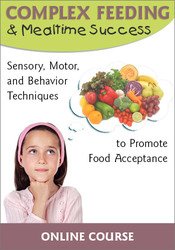Jessica Hunt – Complex Feeding & Mealtime Success Sensory, Motor
$169 Original price was: $169.$48Current price is: $48.
Shopping Instructions:
- DISCOUNT 15% : SHOP15
- Product Delivery: Within 1 – 12 hours after purchase.
Available for Pre-Order. This product will be available within a few days.
Jessica Hunt – Complex Feeding & Mealtime Success Sensory, Motor
Do you work with children who throw food, refuse to sit at a table to eat, or refuse to try new foods? Or maybe they will only eat the same food over and over? And going to a restaurant is out of the question for these families you work with…
These kids may not be just “picky eaters” but instead could have deep-seated skill deficit, medical, dietary or psychological components that must be dealt with first!
1 in 4 ‘typically developing’ kids are diagnosed with a feeding disorder with it increases to 3 in 4 for those with special needs. With this large population of children suffering from these difficulties, there comes a lot of complexity given each unique situation. You will need a vast knowledge base to treat every individual effectively and there has been very little training available — UNTIL NOW…
Get the strategies you need to make mealtimes more peaceful and positive!
Through video case examples, demonstrations and hands-on exercises, you will learn the treatment strategies you need to successfully treat feeding difficulties in children. Not only will you learn the sensory issues causing these feeding difficulties but we will also examine behavior issues and oral motor difficulties. Walk away with advanced techniques to:
- Evaluate the causes of mealtime difficulties: behavior, sensory, oral motor, or a combination
- Decrease food jags and other feeding delays for those suffering with Autism, Cerebral Palsy and other disorders
- Re-establish healthy roles and increase range of foods at the table
- Educate parents and caregivers who often endure emotional or stressful meal times
Develop successful programs that promote active play, self-care, compassionate caregivers and the use of imagination to confidentially take your clients and their families from a battleground dinner table to a social, enjoyable meal!
You will learn much more than the sensory issues causing these feeding difficulties; we will examine behavior issues as well as oral motor difficulties. Get the techniques you need to make mealtimes more peaceful and positive!
- Evaluate how sensory processing, behavior and oral motor skills impact or interfere with each child’s ability to eat.
- Role Play how to implement sensory techniques during and prior to meal times to address difficulties such as not wanting to touch certain foods or sitting at the table.
- Implement oral motor exercises and strategies to promote feeding patterns such as rotary chewing pattern, lip closure and tongue lateralization.
- Explore the misconceptions about feeding that impact special needs children.
- Assess the behaviors that interfere with eating and learn strategies to address the behavior.
- Support and guide the parents, caregivers and other family members through often emotional or stressful meal times.
Walk away with the knowledge to identify the cause(s) of a feeding disorder and develop therapeutic interventions you can begin using immediately.
Dive into the typical development of eating skills, medically recognized nutritional needs of the growing child, and sensory-based approaches to mealtime behavioral issues. Explore a variety of techniques that encourage children to participate during mealtime.
- Communicate commonalities in the development of play, emotional intelligence and mealtime skills.
- Determine common myths about picky eaters and the research-based evidence that contradicts these commonly held assumptions.
- Analyze and differentiate a child’s current food choices for nutritional value and sensory preferences.
- Formulate a plan for successfully introducing new and nourishing foods.
- Integrate therapeutic interventions that motivate and reward expanded food choices and the development of competent eating skill
Would you like to receive Jessica Hunt – Complex Feeding & Mealtime Success Sensory, Motor ?
Improve mood, sleep and focus with these nutrient-rich recipes and handy tips. Eat Right, Feel Right teaches you the do’s and don’ts of using ingredients in entrees, snacks, soups, smoothies and dressings to make you an at-home mental health chef.
• Focus inducing capabilities of lemons and chocolate
• How to start a love affair with beets
• The anxiety reducing powers of vinegar
• How sweet potatoes support an immune system under stress
• Benefits of watermelon as a sleep aid
• Which foods to avoid
• And much more!
Jessica Hunt, OTRL, is the director of occupational therapy and sensory integration programs at the prestigious Kaufman Children’s Center for Speech, Language, Sensory-Motor and Social Connections, Inc., in West Bloomfield, MI. She has extensive experience in pediatric occupational therapy and sensory integration in both the home and clinic settings. In addition, Jessica is trained in “picky eating”, oral-motor therapy including the Beckman protocol, Talk Tools® and craniosacral therapy. She has advanced training in Therapeutic Listening® and Samonas Sound Therapy. Jessica is certified in Handwriting Without Tears®, Sensory Integration and Praxis Test (SIPT) and is an Interactive Metronome® program consultant.
Susan L. Roberts, MDiv, OTR/L, has worked with autistic children, their families, and their communities for more than 20 years, developing “positive” and highly-effective solutions for the home and school. She received her Bachelor of Science in Occupational Therapy from Boston University, and research interests in the sensory aspects of healing rituals led her to a Master of Divinity from Harvard University. Today, her research focuses on the primary occupation of childhood – play, as well as the use of mind/body approaches to achieve optimal health and wellness.
Interact and collaborate with other professionals in the online community through chat boards and online forums. Participants love sharing ideas, asking questions and networking with other practitioners!
Complete your CE tests online at the completion of each module, with instant access to your CE certificates – 12+ CE hours.
Related products
HEALTH & MEDICAL
Dr Heidi M Crocker – Yoga Alignment | Speaker: Heidi Crocker EdD, DC
HEALTH & MEDICAL
HEALTH & MEDICAL
HEALTH & MEDICAL
HEALTH & MEDICAL












